Summoner Character Profile: Part Two
Our conversation with writer Jason Scott continues as he talks about Flece and Rosalind, two of the characters in Summoner.
In
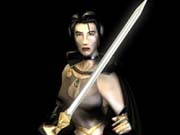
Flece serves as an interesting contrast to the rest of the Summoner cast. Though most of the characters in Summoner are born without a silver spoon in their mouths, Flece's early life seems to be difficult. Caleia, Flece's mother, is born into a peasant family, but she tries to provide a better life for herself by finding work as a maidservant for a local wealthy merchant in the city of Lenele. Unfortunately, Caleia becomes pregnant with the merchant's child, and as such, the merchant promptly dismisses her and forces Caleia to live in the streets, where she gives birth to Flece. Caleia finds work as a prostitute to provide for herself and her child, but once again, she meets with tragedy when a rival stabs her to death in an area known as the Alley of Dogs. The gravediggers find Caleia's body and bury her in an unmarked grave outside the city walls.
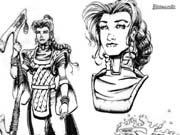
Left on her own in the most dangerous part of Lenele, the Old City, Flece comes under the protection of an outlaw named Tancred, who also goes by the name of the King of Fleas. Tancred's control over the Old City begins to grow as the number of smugglers and thieves increases, and he quickly becomes aware of Flece's own natural pocket-picking abilities. Eventually, Tancred begins to teach her the higher arts of thievery including stealth and the art of deception.
Rosalind's life starts out in a manner similar to Flece's, but the circumstances are much different. While looking for the summoner Joseph, Yago--a monk of the Order of Iona--falls in love with a woman named Ursanne who just happens to be the daughter of a minor lord. Ursanne eventually becomes pregnant, but Yago leaves her to continue his search. When Ursanne's father learns of her pregnancy, she's disowned and forced to live alone with her daughter, Rosalind. Shortly thereafter, Ursanne is killed by the plague, so Rosalind is orphaned and forced to live on her own. No one really knows how Rosalind makes her way to the Order of Iona, but she does, and the monks there notice she shows promise as a student of the order. A number of years later, Rosalind's skills have progressed and she begins to learn Aosi--the language of the gods.
The second part of our interview with Jason Scott delves into the personalities of Flece and Rosalind, how they interact in the game, and how they develop as characters.
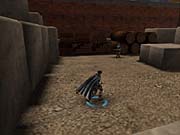
GameSpot: Obviously, secondary characters can be important in that they expose elements of the plot as well as different aspects of the main characters' personalities. How large a role did secondary characters play in writing Summoner's story?
Jason Scott: Of course, Yago and Murod are both crucial. The choices that these characters made 20 years ago establish the foundation of the story. Everything begins with these two screwups.
The royal family of Medeva also plays an important supporting role. King Bellias orders Jekhar to join the party, while Queen Galienne and Prince Sornehan reveal vital information for the summoner's quest. The Ulsadana of the Khosani also serves a similar function while articulating her culture's unique perspective on the mythology and history of the world.
GS: Joseph encounters a number of characters on his journey--the first is an old man named Yago. What is his background and why does he seek out Joseph?
JS: Yago had been a monk of the Order of Iona, ascetics devoted to the study of the language of the gods. Yago learned of a prophecy that Murod, the Emperor of Orenia, would be overthrown by someone born with the mark of the summoner.
The emperor wanted to rebuild the Tower of Eleh and become a god, and he enslaved his people to achieve that goal. Hoping to spare the Kingdom of Medeva from Murod's tyranny, Yago decided to intervene and find the summoner first.
So Yago walked the earth for 10 years until he stumbled upon Joseph in the village of Ciran. By this point, Yago had found one of the rings of summoning, and he used it to train Joseph to use his power. As the story goes, Joseph destroyed his village instead, so he and Yago went their separate ways.
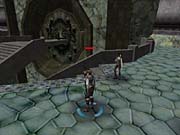
Joseph's first objective in the game is to find Yago in the city of Lenele. He learns that Yago has hooked up with Prince Sornehan, who also studied at Iona. Once a monk leaves Iona, he may never return, so Yago and Sornehan are brothers in exile.
GS: Rosalind, one of the game's more mysterious characters, is the illegitimate daughter of Yago. How has this affected her personality and how does it make her feel toward Joseph, who has essentially become Yago's son?
JS: The ironic thing about Rosalind is she hates her father but follows in his footsteps at the Iona monastery. Her hatred stems from his abandonment of her mother shortly after Rosalind was born.
When Joseph shows up at Iona, he has the deck stacked against him. Rosalind hates Joseph because Yago abandoned her mother for his sake, and in her eyes, he completely fails to measure up to the role that fate has chosen for him. He's nothing but a plowboy from the sticks, not the messianic hero poised to redeem the world.
Ultimately, Rosalind is seeking some kind of power. Though she wasn't born with a mark on her hand, the language of the gods is so powerful that it eventually drives its readers to death or madness. The message here is clear: Don't be like Rosalind, kids.
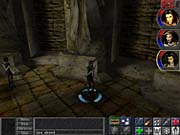
GS: Flece seems to be one of the few main characters who doesn't have a direct association with Joseph. How has her background shaped her character? Are the other characters doubtful of her loyalty to the other group members because of her background and current occupation?
JS: Flece does take some abuse from Rosalind early in the game because she's a "guttersnipe." As far as loyalty is concerned, however, none of the characters have much love for Joseph at the beginning. Rosalind and Jekhar are both following orders, though they both have their reasons for hating Joseph. Flece is more of a mercenary. She's along for the glamorous gifts and prizes--fabulous merchandise. In that sense, Flece is the most loyal because she's the least conflicted. As long as the loot keeps coming in, she's happy.
GS: Do these characters develop as much as Joseph, or did you want to make them a little less dynamic and instead place the emphasis on Joseph?
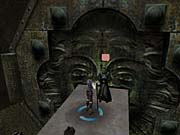
JS: All the characters experience some kind of change or epiphany by the end of the game. Of course, Joseph's development is more dramatic than that of his companions. Without giving too much away, however, one of the other characters undergoes a radical, life-altering transformation. And it's not a baby.
GS: How did you go about developing the personalities of these characters? Did you write specific background stories for each character and work from there or did you have a more general concept of how the characters would turn out?
JS: The major characters were all in place by the time I started working on the Summoner story. One of my first objectives was to develop the back story and motivations that would drive the actions of these characters. So I guess the process involved working from the general (an outline of the story) to the specific (defining the history and psychology of the characters). But the process is more cyclical than linear. Even as I was putting the finishing touches on the dialogue, details would emerge that would color and shape the story in new ways.
GS: Are there any major themes you wanted people to get out of the story while playing Summoner?
JS: Questions are more interesting than answers, so the game doesn't really have a "message" per se. The one conflict that all the major characters seem to share is the tension between the frailties and complexities of one's psychology and the ideals that one is obligated to uphold or represent by virtue of one's station in life. Failure to reconcile these differences creates all kinds of tension, as the characters in Summoner demonstrate. It's a problem you see in the history books all the time--kings and popes rarely lived up to their mandates.
The theme of prophecy, destiny, or fate is central to the story, but the emphasis isn't so much on a preordained fate as it is on doing what needs to be done, even if that's the last thing in the world you want to do. The message here is simple: Kids, before you sit down to play Summoner, do your homework. Make your bed. Help your mom and dad around the house. It's your destiny.
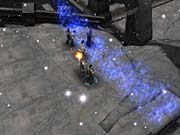
GS: How important was it to cater to two different types of role-playing game fans--the players who explore every last inch of the environment and talk to all of the characters and the players who rush through the game as quickly as possible--and still retain a deep story?
JS: We came up with a simple (albeit heavy-handed) trick to pull this off. All the characters you should talk to have an icon floating above their heads. This means that in Lenele, you don't need to initiate a conversation with each of the hundreds of NPCs that populate the city. If you look for the icon, you'll find all the miniquest characters, merchants, and story NPCs you need to find. Some players love to learn about tariffs, midwifery, and the silk trade, but others just want to get from point A to point B.
That's one of the major challenges of creating an RPG--there are so many different styles of play. It's a Balkanized market (console vs. PC, American vs. Japanese, Final Fantasy vs. Baldur's Gate and Diablo, etc.). Some PS2 players hate Summoner, others contend that it's the greatest RPG ever made. It's impossible to please everyone, so it becomes important to remain faithful to your vision of the game.
GS: What aspect of Summoner's story, or which characters, are you most proud of creating?
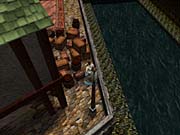
JS: Probably my favorites would have to be the interactive dialogue and scenes involving the Medevan court. We had wonderful voice talent to work with, and they pulled those scenes off beautifully. I'm also fond of Iona and Wolong.
GS: Are there any parts of the story or any characters you wish you could change?
JS: A lot of people have complained that the beginning is too slow, and most of the negative reception has been due to critics not playing past the first few levels of the game.
On one hand, that's entirely our fault. We should have done more to draw the player into the gameworld right from the very beginning. In hindsight, it's obvious, but when you're in the middle of development, it's difficult to see things from the eyes of a new player. It's a hard lesson, but one that we won't forget.
On the other hand, the game rewards the patient player. Once you find Yago and get into the quest for the summoner's rings, the story really takes off. Our problem was that we saved too much of the cool stuff for later in the game.
GS: Did you intentionally design the story so that the game leaves a wide-open window for a sequel?
JS: As a rule, endings are hard to pull off effectively. They're the most artificial part of the story. Real life goes on and on, without much sense of closure. But in a game, that's not terribly satisfying. People want to know what happens.
In Summoner, we provide plenty of closure for Joseph and his companions. All the major threads and questions are wrapped up by the end. The world of Summoner is so huge and sprawling, however, that we have tons of material to work with for the sequel. We are far from exhausting its potential.
GS: Thanks, Jason.
Got a news tip or want to contact us directly? Email news@gamespot.com
Join the conversation